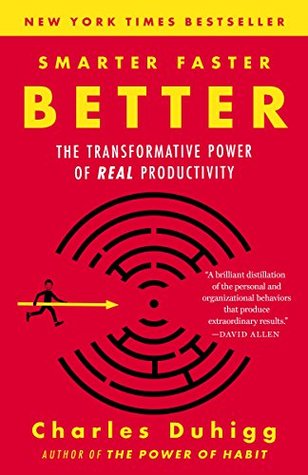More on this book
Community
Kindle Notes & Highlights
Read between
July 31 - October 4, 2021
Motivation is more like a skill, akin to reading or writing, that can be learned and honed.
When people believe they are in control, they tend to work harder and push themselves more.
Even if making a decision delivers no benefit, people still want the freedom to choose.
Find a choice, almost any choice, that allows you to exert control.
The specific choice we make matters less than the assertion of control.
Researchers have found that people with an internal locus of control tend to praise or blame themselves for success or failure, rather than assigning responsibility to things outside their influence.
In general, young kids think that intelligence is an innate capacity, so telling young people they are smart reinforces their belief that success or failure is based on factors outside of their control.
“Internal locus of control is a learned skill,” Carol Dweck,
We praise people for doing things that are hard. That’s how they learn to believe they can do them.”
If you can link something hard to a choice you care about, it makes the task easier,
That’s why they asked each other questions starting with “why.” Make a chore into a meaningful decision, and self-motivation will emerge.
Moreover, to teach ourselves to self-motivate more easily, we need to learn to see our choices not just as expressions of control but also as affirmations of our values and goals.
An internal locus of control emerges when we develop a mental habit of transforming chores into meaningful choices,
Self-motivation, in other words, is a choice we make because it is part of something bigger and more emotionally rewarding than the immediate task that needs doing.
Ultimately, researchers had identified eight critical management skills.
The ‘who’ part of the equation didn’t seem to matter.”
Norms are the traditions, behavioral standards, and unwritten rules that govern how we function.
Psychological safety is a “shared belief, held by members of a team, that the group is a safe place for taking risks.”
It is “a sense of confidence that the team will not embarrass, reject, or punish someone for speaking up,”
The researchers eventually concluded that the good teams had succeeded not because of innate qualities of team members, but because of how they treated one another.
There were, however, two behaviors that all the good teams shared.
First, all the members of the good teams spoke in roughly the same proportion, a phenomenon the researchers referred to as “equality in distribution of conversational turn-taking.”
Second, the good teams tested as having “high average social sensitivity”—a fancy way of saying that the groups were skilled at intuiting how members felt based on their tone of voice, how people held themselves, and the expressions on their faces.
For psychological safety to emerge among a group, teammates don’t have to be friends. They do, however, need to be socially sensitive and ensure everyone feels heard.
Teams need to believe that their work is important. Teams need to feel their work is personally meaningful. Teams need clear goals and defined roles. Team members need to know they can depend on one another. But, most important, teams need psychological safety.
Are you encouraging equality in speaking, or rewarding the loudest people?
Some team leaders at Google make checkmarks next to people’s names each time they speak, and won’t end a meeting until those checks are all roughly equivalent.
“cognitive tunneling”—a mental glitch that sometimes occurs when our brains are forced to transition abruptly from relaxed automation to panicked attention.
However, once in a cognitive tunnel, we lose our ability to direct our focus. Instead, we latch on to the easiest and most obvious stimulus, often at the cost of common sense.
Narrate your life, as you are living it, and you’ll encode those experiences deeper in your brain.
And so, for a stretch goal to become more than just an aspiration, we need a disciplined mindset to show us how to turn a far-off objective into a series of realistic short-term aims.
“I usually had a note in my pocket,” he told the audience, “and on that little note, it said, ‘and if not?’
“Every person in an organization has the right to be the company’s top expert at something,”
But you have to be comfortable not knowing exactly where life is going.
All we can do is learn how to make the best decisions that are in front of us, and trust that, over time, the odds will be in our favor.”
modern yet timeless.
If you can’t let go of what you’ve worked so hard to achieve, it ends up trapping you.”
Put differently, writing is more disfluent than typing, because it requires more labor and captures fewer verbatim phrases. When the researchers looked at the test scores of those two groups, however, they found that the hand writers scored twice as well as the typists in remembering what a lecturer said.
If you read a book filled with new ideas, force yourself to put it down and explain the concepts to someone sitting next to you and you’ll be more likely to apply them in your life. When you find a new piece of information,


